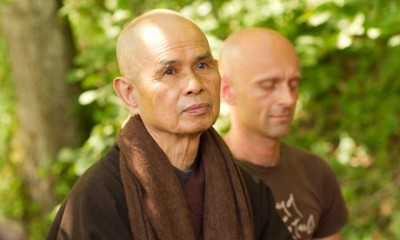In yesterday’s article on The Business of Mindfulness, we learned that Zen Master Thich Nhat Hanh visited Google just last month. We learned that he would only visit Google if they would offer a day of mindfulness. It is apparent that Google likes Thich Nhat Hanh! He is known as Thay by his hundreds of thousands of followers around the world.
In a long article in the Guardian sustainable Business section, the author, Jo Confino has many quotes from Thay in his talks with Google and 20 or more other hi-tech CEO’s. The quotes come in subsections of the article, which are indicated below. [Read More…].
In the section titled, “Our voracious economic system,” Jo writes,
Thay, who warns that civilization is at risk of collapse from the environmental and social damage caused by the voraciousness of our economic system, offers an alternative vision that focuses on true happiness, which he believes we have sacrificed on the altar of materialism. …
Pointing to our addiction to consumption as a clear sign we are trying to paper over our suffering, Thay suggests we should go in the opposite direction, to the very heart of our pain, in order to transcend it.
Mindful consumption is one of the primary topics of Meditation Practices for Healing and Well-being. You can read many articles right on this blog. Just follow the links in the mindful consumption tab, below.
About business needing a fundamental shift in consciousness, Thay had this to say:
You have to consider your idea of happiness. You think it is possible only if you win, if you are on the top.
But it is not necessarily like that, because even if you are successful in making more money, you still suffer. You compete because you’re not happy and meditation can help you to suffer less.
Many of us think you can only be happy when you leave other people behind; you are number one. You do not need to be number one to be happy.
There must be a spiritual dimension in your life and in your business, otherwise you cannot deal with the suffering caused by your work or your daily life.
Thay has also guided us that we have everything we need to be happy in the present moment.
In the section on Martin Luther King, the author talks about the same issues you find here: In Memory Of Dr. Martin Luther King.
About mindfulness in the workplace, Thay is quoted to have said,
Meditation practice can help business to suffer less. That is good already because if your employees are happy, your business can improve.
If your business is causing environmental problems, then because you have practiced meditation you may have an idea of how to conduct your business in such a way that you will harm nature less.
Meditation can calm your suffering and give you more insight and more right view on yourself and on the world and if you have a collective wisdom, then naturally you will want to handle and conduct your business in such a way that will make the world suffer less.
This is why Google likes Thich Nhat Hanh:
Staff at Google want to know how to transform their suffering just like all other living beings.
Many of them are very young and intelligent so they can understand the teaching and practice well and can spread this and they have the means to do that.
It will help for them to know that everyone has the wish to do good because all of us have Buddha nature. When you look at the path which is not noble, you can see the other path. So looking into suffering you see the way of happiness; that is the teaching of the four noble truths and you do not need to be Buddhist to understand that.
Our society needs a collective awakening in order to save ourselves from the crisis we are in. So the practice is that awakening should take place in every step, every breath. And if you have awakening you know you have a path of happiness. You stop suffering and then you can help other people to do the same.
As good as technology is, and as well-intentioned people like the executives and staff at Google and other companies might be, the bottom line is that mindfulness is needed to educate the world about mindful consumption in order to protect nature and limit climate change. If this is the direction that the business of mindfulness takes, we will work together to save the planet.
If mindfulness in the workplace is used to solely benefit the bottom line of companies that use it, we are in deep trouble.
We need to encourage companies to develop not only mindfulness, but concentration and insight. If done properly with specific attention to mindful consumption and interbeing – the insight that we live in one interconnected planet, solar system, galaxy, and universe – we will move in the right direction.
What are your thoughts about mindfulness in the workplace? Please share.








You must be logged in to post a comment.